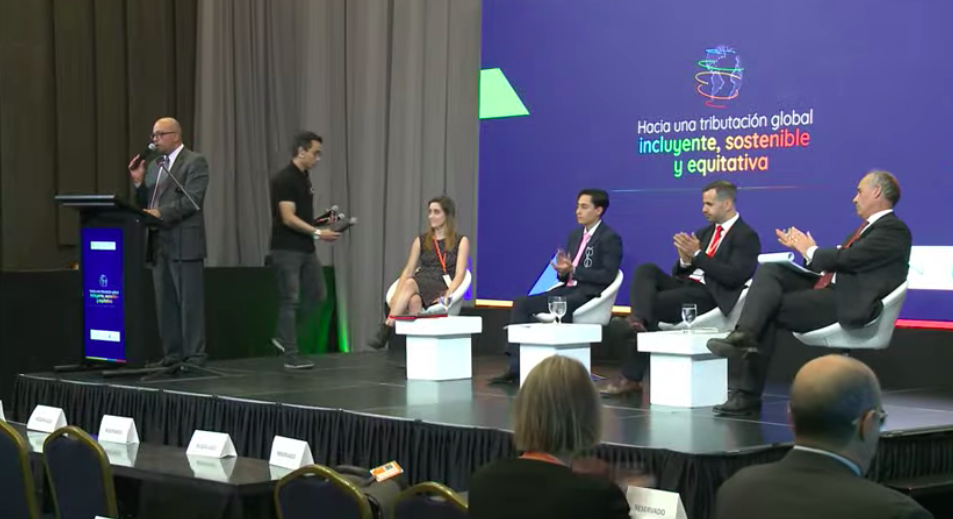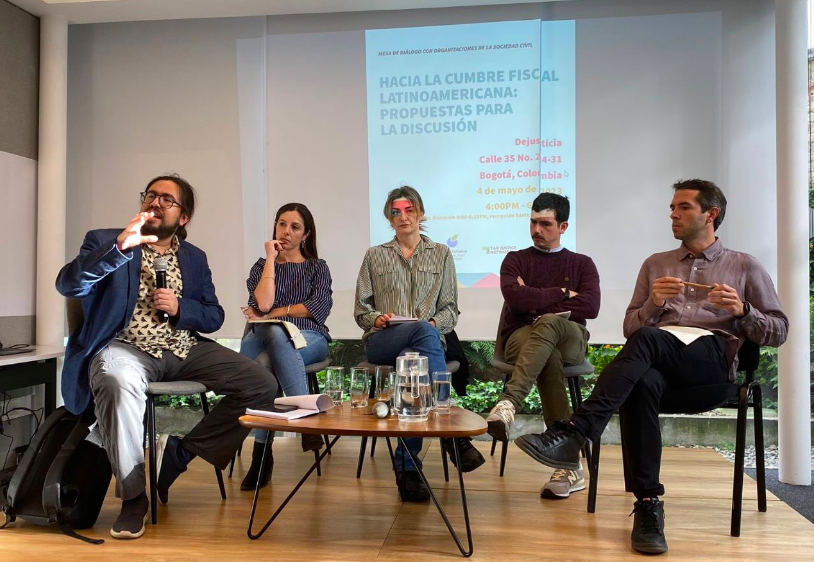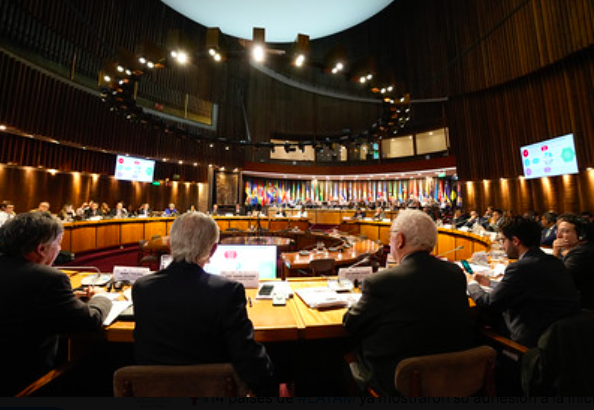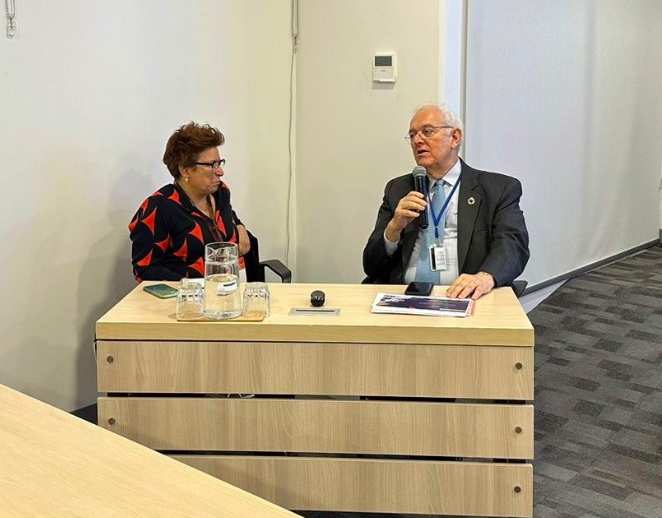
Latin America joins forces to tackle tax havens
May was a crucial month for Latin America and the Caribbean towards greater fiscal justice. During the regional fiscal seminar organized by ECLAC from May 15th to 17th in Santiago, Chile, the countries of Colombia, Chile, and Brazil made a historic announcement regarding the creation of the first fiscal cooperation platform for Latin America. In addition, Chilean President Gabriel Boric announced during his public address his commitment to co-host the first Latin American Summit for a fair, sustainable, and equitable global taxation, which will take place in Cartagena de Indias on July 27th and 28th, 2023.
Additionally, a sequence of events unfolded in Bogotá and Santiago, involving representatives from Latin American governments, civil society, academics, international organizations, donors and GIESCR among them. These gatherings aimed to lay the groundwork for the first Latin American Fiscal Summit. If Latin America can effectively tackle the obstacles associated with global taxation and harmonise them with its human rights commitments, it has the potential to emerge as a worldwide exemplar in ensuring that major corporations and the most affluent individuals pay their fair share of taxes.
Academic event in Bogotá, Colombia
On May 2nd and 3rd we were present at an academic event, organized by the Colombian government, in collaboration with academia and civil society, in Bogotá, Colombia.
The event aimed to provide academic and public policy insights for the upcoming Latin American Fiscal Summit scheduled for July 26th and 27th, 2023.
A total of 21 authors from 10 countries were carefully selected to present their papers at this academic gathering. The topics covered a wide range of issues, including individual taxation, tax incentives, transparency, tax evasion and avoidance, human rights, climate change and global taxation, governance, and processes.
Throughout the discussions, particular emphasis was placed on addressing the challenges of reforming the international tax system beyond the OECD's two-pillar solution. Furthermore, the event highlighted the necessity for Latin America to unify its voice within the Global South to promote sustainable development and exert influence in global tax negotiations, which often have adverse effects on the region's countries.

UNDP event, Bogotá, Colombia
On May 4th, the UNDP (Colombia) organized a collaborative event with civil society, aimed at understanding the perceptions, positions, and demands of civil society regarding the regional tax debate, which we attended. The objective was to develop recommendations that contribute to opening public dialogues and deliberations, where civil society takes a leading role in addressing the issues that affect it. The methodology consisted of two main components: gathering information on the concerns of civil society and the general population, and reflecting on how to change perceptions regarding the urgency of progressive tax reforms.
Among the participants, one of the main points of agreement was the necessity to promote a regional tax system based on human rights and the protection of the planet. It was particularly emphasized that fiscal policy should not be seen solely as a means of macroeconomic stabilization (for revenue and redistribution purposes), but rather as an effective instrument to fulfill the human rights obligations of states, which should guide government actions.
A series of recommendations to Latin American governments were also discussed, emphasizing the need to achieve regional agreements through fiscal cooperation actions that can influence global tax policy. These actions would promote development, wealth redistribution, and the reduction of social inequalities.
"Towards the Latin American Fiscal Summit: Proposals for Discussion." Dialogue table with civil society organizations
As part of a series of events held in Bogotá in preparation for the Fiscal Summit, GI-ESCR with Dejusticia, Initiative for Human Rights Principles in Fiscal Policy, ICRICT, and Tax Justice Network organized a meeting aimed at creating a space for dialogue to discuss possible fiscal policy and human rights proposals that could shape a common regional agenda.
The event was moderated by Sergio Chaparro (TJN), and the panelists included María Emilia Mamberti (CESR), Alejandro Rodriguez-Llach (ICRICT), Vicente Silva (GI-ESCR), Eva Danzi (TJN), with comments from Rodrigo Uprimny (DeJusticia) and Julieta Rossi (UN DESC Committee).
Over 40 people attended this in-person event held at DeJusticia's office.

"Towards a New Fiscal Pact in Latin America"
On May 5th, GI-ESCR, along with our allies Oxfam, Initiative for Human Rights Principles in Fiscal Policy, Tax Justice Network, Latin American and Caribbean Network for Fiscal Justice, ICRICT, and Latindadd, organised a civil society event at the Hotel Tequendama. The objective of the meeting was to strengthen the role of civil society in this process by developing campaign strategies and common proposals on progressive taxation in the context of the current multiple crises.
The event successfully developed collective narratives of fiscal justice connected to the climate, gender, public services, defense of democracy, human rights, and other cross-cutting thematic axes related to fiscal justice.
Moreover, through dynamics and interactive dialogues, issues related to the narrative and scope of the regional campaign were discussed, as well as the coordination of different national and regional actors, identifying opportunities for influence in national, regional, and international contexts regarding progressive taxation, and coordinating advocacy actions directly focused on the Cartagena fiscal summit process.
Regional fiscal seminar at ECLAC, Santiago de Chile
On May 15th to 17th at the regional fiscal seminar organised by ECLAC in Santiago, Chile, the countries of Colombia, Chile, and Brazil made a historic announcement regarding the establishment of a fiscal cooperation platform for Latin America. This platform will be under the executive secretariat of ECLAC and will serve as a permanent governance forum based on the agreements reached at the Cartagena Fiscal Summit.
14 Latin American countries and various international organisations have already expressed their support for this initiative, which aims to enhance fiscal cooperation to ensure the financing of public services, the transition to a sustainable economy, and the reduction of inequalities.

Meeting with the Chilean government
On May 17th, GI-ESCR, along with partners, organised a meeting at ECLAC, aimed at engaging in discussions with different political actors in Chile about the Initiative for a fair, equitable, and sustainable global taxation.
The main speaker at the meeting was José Antonio Ocampo, and it involved the participation of political party think tanks, Chilean and Latin American civil society, as well as government teams from Chile (Ministry of Finance, General Secretariat of the Presidency, Presidency, and Subsecretariat of International Relations).
During the meeting, topics related to the process and governance of the Fiscal Summit were discussed, as well as the possibility of building a roadmap to address tax havens through the coordination of different political actors in Latin America. Additionally, the importance of promoting active participation of civil society in the debate and design of national and regional fiscal policies was emphasised, through mechanisms of consultation and dialogue that allow for the inclusion of voices and perspectives from different groups and sectors of society.

In the upcoming weeks, GI-ESCR, along with our partners, will be conducting a regional campaign towards the fiscal summit, actively participating in the process to ensure that human rights are at the centre of the discussions and collaborating with governments to ensure the success of the summit and the long-term objectives of governance and integration.




